Nissan Leaf 2 (ZE1)
Compact HatchbackProduct Gallery
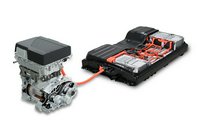
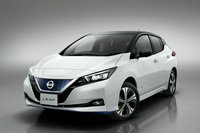
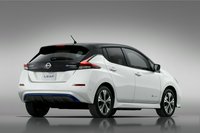
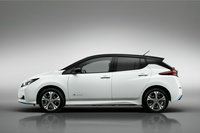
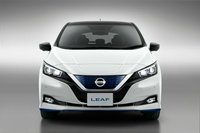
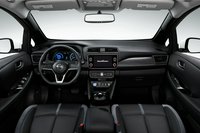
Product Overview
Nissan Leaf Mk2 (chassis code ZE1) is an entry-level compact hatchback in production from 2017. It is powered by electric motors from 150hp to 218hp aided by batteries from 40kWh to 62kWh.
Compared to the original Leaf, the Mk2 has an improved styling, though it remains ugly. Nissan has equipped it with more powerful motors and larger batteries for a more usable range, though the car still falls short on this front.
Nissan has made a good effort in aerodynamics, with a decent 0.28 coefficient of drag to show for it.
Ratings
What we found
Neofiliac score 8%
Pros
- Good 0.28 drag coefficient
Cons
- Poor performance
- Poor interior
- Poor handling
- Ugly
- Battery degradation
What external reviewers found
External score 67%
Pros
- Excellent range
- Good range and power
- Excellent infotainment system
- Superb tech
- Decent ride quality
Cons
- Lack of standard equipment
- Lacklustre infotainment
- Expensive compared to rivals
- Limited cargo space
- Not as practical as VW ID.3
Your rating:
12345678910
?/10
Price Comparison
As associates of the merchants above, we earn a commission when you make a purchase using the supplied links.
Specifications
[[{"Ft":"Capacity","Fn":"Cargo Capacity","Fv":"385 L / 13.6 cu-ft"},{"Ft":"Capacity","Fn":"Passengers","Fv":"5"},{"Ft":"Capacity","Fn":"Payload","Fv":"275 kg / 606 lbs"},{"Ft":"Chassis","Fn":"Brakes | Front","Fv":"Ventilated discs"},{"Ft":"Chassis","Fn":"Brakes | Rear","Fv":"Disc"},{"Ft":"Chassis","Fn":"Power Steering","Fv":"Electric Steering"},{"Ft":"Chassis","Fn":"Suspension | Front","Fv":"MacPherson strut"},{"Ft":"Chassis","Fn":"Suspension | Rear","Fv":"Torsion"},{"Ft":"Chassis","Fn":"Tire Size","Fv":"205/55 R16, 215/50 R17"},{"Ft":"Chassis","Fn":"Turning Circle","Fv":"10.6 m / 34.8 ft"},{"Ft":"Construction","Fn":"Battery | Capacity","Fv":"40.0 kWh (gross)"},{"Ft":"Construction","Fn":"Body Style","Fv":"5-door battery-electric Hatchback"},{"Ft":"Dimensions","Fn":"Ground Clearance","Fv":"150 mm / 5.9 in"},{"Ft":"Dimensions","Fn":"Size | Height","Fv":"1540 mm / 60.6 in"},{"Ft":"Dimensions","Fn":"Size | Length","Fv":"4480 mm / 176.4 in"},{"Ft":"Dimensions","Fn":"Size | Width","Fv":"1790 mm / 70.5 in"},{"Ft":"Dimensions","Fn":"Track Width | Front","Fv":"1530.0 mm / 60.2 in"},{"Ft":"Dimensions","Fn":"Track Width | Rear","Fv":"1545.0 mm / 60.8 in"},{"Ft":"Dimensions","Fn":"Weight","Fv":"1490.0 kg / 3284.9 lbs"},{"Ft":"Dimensions","Fn":"Wheel Size","Fv":"16 in, 17 in"},{"Ft":"Dimensions","Fn":"Wheelbase","Fv":"2700 mm / 106.3 in"},{"Ft":"Performance","Fn":"Acceleration | 0 - 100 km/h","Fv":"7.3 sec"},{"Ft":"Performance","Fn":"Acceleration | 0 - 60 mph","Fv":"6.9 sec"},{"Ft":"Performance","Fn":"Coefficient Of Drag","Fv":"0.28"},{"Ft":"Performance","Fn":"Top Speed","Fv":"157.0 km/h / 97.6 mph"},{"Ft":"Powertrain","Fn":"Drivetrain Layout","Fv":"Front-wheel drive"},{"Ft":"Powertrain","Fn":"Engine | Power","Fv":"150 hp / 111.9 kW @ 3283-9795 rpm"},{"Ft":"Powertrain","Fn":"Transmission | Gears","Fv":"1-speed"},{"Ft":"Powertrain","Fn":"Transmission | Type","Fv":"Automatic"},{"Ft":"Production","Fn":"Availability","Fv":"2017"}],[{"Ft":"Capacity","Fn":"Cargo Capacity","Fv":"385 L / 13.6 cu-ft"},{"Ft":"Capacity","Fn":"Passengers","Fv":"5"},{"Ft":"Capacity","Fn":"Payload","Fv":"275 kg / 606 lbs"},{"Ft":"Chassis","Fn":"Brakes | Front","Fv":"Ventilated discs"},{"Ft":"Chassis","Fn":"Brakes | Rear","Fv":"Disc"},{"Ft":"Chassis","Fn":"Power Steering","Fv":"Electric Steering"},{"Ft":"Chassis","Fn":"Suspension | Front","Fv":"MacPherson strut"},{"Ft":"Chassis","Fn":"Suspension | Rear","Fv":"Torsion"},{"Ft":"Chassis","Fn":"Tire Size","Fv":"215/50 R17"},{"Ft":"Chassis","Fn":"Turning Circle","Fv":"10.6 m / 34.8 ft"},{"Ft":"Construction","Fn":"Battery | Capacity","Fv":"62.0 kWh (gross)"},{"Ft":"Construction","Fn":"Body Style","Fv":"5-door battery-electric Hatchback"},{"Ft":"Dimensions","Fn":"Ground Clearance","Fv":"135 mm / 5.3 in"},{"Ft":"Dimensions","Fn":"Size | Height","Fv":"1540 mm / 60.6 in"},{"Ft":"Dimensions","Fn":"Size | Length","Fv":"4490 mm / 176.8 in"},{"Ft":"Dimensions","Fn":"Size | Width","Fv":"1788 mm / 70.4 in | 2030 mm / 79.9 in (mirror unfolded)"},{"Ft":"Dimensions","Fn":"Track Width | Front","Fv":"1530.0 mm / 60.2 in"},{"Ft":"Dimensions","Fn":"Track Width | Rear","Fv":"1545.0 mm / 60.8 in"},{"Ft":"Dimensions","Fn":"Weight","Fv":"1670.0 kg / 3681.7 lbs"},{"Ft":"Dimensions","Fn":"Wheel Size","Fv":"6.5J x 17"},{"Ft":"Dimensions","Fn":"Wheelbase","Fv":"2700 mm / 106.3 in"},{"Ft":"Performance","Fn":"Acceleration | 0 - 100 km/h","Fv":"7.3 sec"},{"Ft":"Performance","Fn":"Acceleration | 0 - 60 mph","Fv":"6.9 sec"},{"Ft":"Performance","Fn":"Coefficient Of Drag","Fv":"0.28"},{"Ft":"Performance","Fn":"Top Speed","Fv":"157.0 km/h / 97.6 mph"},{"Ft":"Powertrain","Fn":"Drivetrain Layout","Fv":"Front-wheel drive"},{"Ft":"Powertrain","Fn":"Engine | Power","Fv":"218 hp / 162.6 kW @ 4600-5800 rpm"},{"Ft":"Powertrain","Fn":"Transmission | Gears","Fv":"1-speed"},{"Ft":"Powertrain","Fn":"Transmission | Type","Fv":"Automatic"},{"Ft":"Production","Fn":"Availability","Fv":"2019"}]]
| Leaf | Leaf e+ |
|---|
External Reviews
autocar[1]
Reviewer score 66% (normalized by Neofiliac)The new Nissan Leaf is slightly bigger than the old one, making it more spacious inside, and practical: the boot is 405 litres, up from 370. The most notable driving feature of the Leaf is the new ‘ePedal’ setting which, when selected, kicks in regenerative braking as soon as you lift off the accelerator pedal. The touchscreen and other general material quality can’t match the perceived quality of traditionally powered cars at this price level.
Pros
- Bigger and more practical than its predecessor
- Impressive range
Cons
- Expensive compared to rivals
autoexpress[2]
Reviewer score 78% (normalized by Neofiliac)Nissan Leaf was an electric pioneer, it now has a fast-growing number of rivals that come in a variety of guises. The main opposition will no doubt be the popular VW ID3, while the Renault Zoe is a supermini-sized option. Hyundai now offers the Kona Electric, which has more usable range, as does the Kia e-Niro, and the BMW i3.
Pros
- Powerful electric motor
- Excellent infotainment system
- Decent range
Cons
- Alternatives offer more range
- Not as practical as VW ID.3
carmagazine[3]
Reviewer score 67% (normalized by Neofiliac)Nissan Leaf comes in three trim levels: Acenta, N-Connecta and Tekna. UK prices start at £26,995, a figure which includes the £1,500 government electric car grant. Leaf e+ only comes in N-connecta or Tekna trims, with the former starting from £32,945 on the road.
Pros
- Bigger and more powerful than the first-generation Leaf
- Good range and power
Cons
- Laggy to respond
- Lags behind rivals
cnet[4]
Reviewer score 78% (normalized by Neofiliac)The Leaf Plus comes with plenty of standard tech, including an 8-inch touchscreen with Apple CarPlay and Android Auto. Automatic emergency braking is the only standard driver-assistance feature. The Tesla Model 3 Standard Range is also more fun to drive than the Leaf, and is about $3,000 cheaper.
Pros
- More fun to drive than the Leaf
- Lots of standard driver-assistance features
- Comfortable ride
Cons
- No adaptive cruise control
- Expensive compared to rivals
digitaltrends[5]
Reviewer score 58% (normalized by Neofiliac)The 2019 Nissan Leaf Plus is great for anyone who wants an electric car that feels like a normal car. With 258 miles of range, the Hyundai Kona Electric should be a threat to the Tesla Model 3. The base S trim level is the only one to achieve the Leaf Plus' headline 226-mile range. The Leaf Plus also comes standard with autonomous emergency braking.
Pros
- Excellent range
- Comfortable ride
- Competitively priced
Cons
- Lack of tech
- Limited cargo space
pcmag[6]
Reviewer score 75% (normalized by Neofiliac)The Nissan Leaf Plus is available with a full complement of driver assists. ProPilot Assist keeps the car centered in its lane and can provide semi-autonomous driving. The top-of-the-line Nissan SL Plus trim starts at $42,550. The Leaf Plus's added power is a palpable cut above the regular Leaf.
Pros
- Smaller battery than the regular Leaf
- More range than the standard Leaf
- NissanConnect Navigation and Services adds telematics features
Cons
- Lack of standard equipment
tomsguide[7]
Reviewer score 71% (normalized by Neofiliac)The Nissan Leaf is a good EV. It's not the best nor will it make Nissan CEO Makato Uchida the second richest man in the world. Most importantly, it put it at a competitive price, beating Tesla to the sub-$30K and sub-$20K (with incentives) It's priced within striking range of the Toyota Prius.
Pros
- Comfortable to drive
- Good range for sub-$30K vehicles
Cons
- Not the most luxurious
- No wireless charging
Also Check
References
- ^ Nissan Leaf 2018 UK review. [autocar].
- ^ Nissan Leaf review. [autoexpress].
- ^ Nissan Leaf review: the whole EV range driven. [carmagazine].
- ^ 2019 Nissan Leaf Plus review: A better EV, but maybe not the best. [cnet].
- ^ 2019 Nissan Leaf Plus review. [digitaltrends].
- ^ 2019 Nissan Leaf SV Plus Review. [pcmag].
- ^ 2022 Nissan Leaf review: A great EV value . [tomsguide].
<
>
x